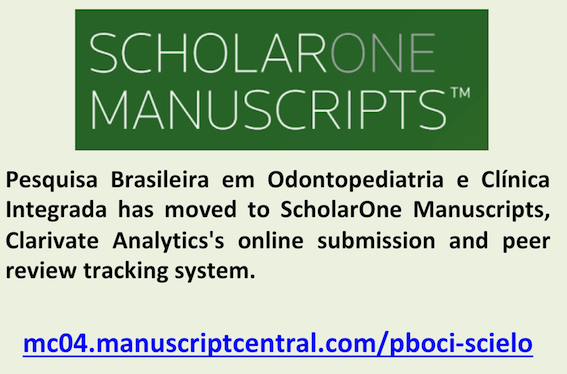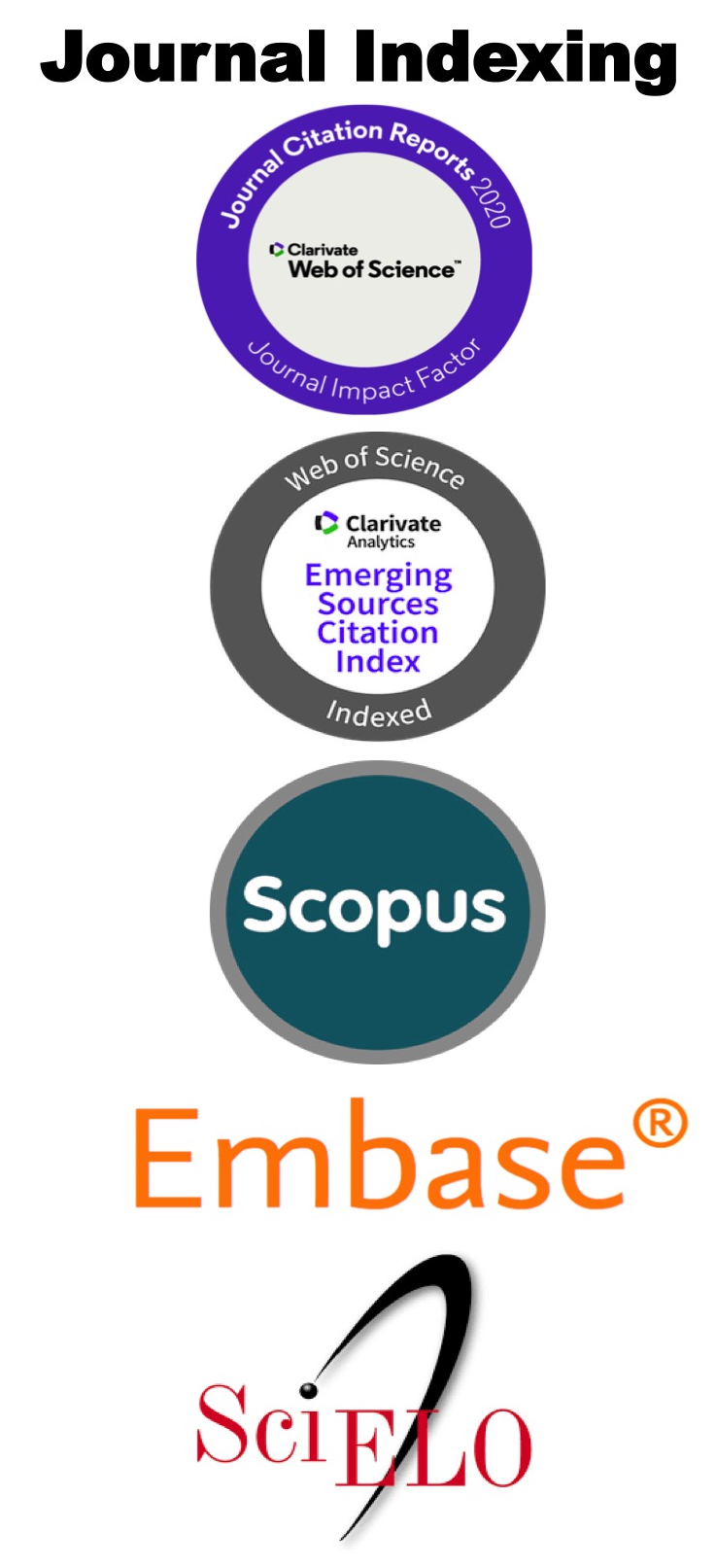Syphilis and Urogenital Diseases during Pregnancy and Developmental Defects of Enamel: A Brazilian Prenatal Cohort (BRISA)
Keywords:
Developmental Defects of Enamel, Epidemiologic Methods, Pregnant People, InfectionsAbstract
Objective: To evaluate the effect of syphilis and urogenital diseases (SUD) during pregnancy on developmental defects of enamel (DDE) using causal inference models. Material and Methods: This study is a prospective cohort – the Brazilian Ribeirão Preto and São Luís Cohort Study (BRISA) – including 865 mother-child dyads, evaluated in three moments: prenatal care (22nd and 25th weeks of gestational age); baby birth; and between 12.3-36 months of age. The outcome was assessed according to the modified DDE index. The exposition, SUD, comprised at least one of the following infections: bacterial vaginosis, urinary tract infection, and syphilis. The covariables included in the theoretical model were socioeconomic situation (SES), low birth weight, mother’s age, number of prenatal care visits (PCV), hypertension, diabetes, medication use during pregnancy, and child’s age. Based on the proposed directed acyclic graph (DAG), SES and the number of PCV were the minimal set of covariables for the adjusted model. The effects were estimated by causal inference using a marginal structural model (Average Treatment Effect - ATE coefficients). Results: SUD did not interfere in the incidence of DDE (ATE: -0.92; CI95%: -0.23-0.49; p=0.202). Conclusion: SUD during pregnancy does not have a causal effect on DDE on primary dentition. Another possibility is that other infections not included in the model may have confounded the association, biasing toward the null hypothesis.
References
Masterson EE, Fitzpatrick AL, Enquobahrie DA, Mancl LA, Eisenberg DTA, Conde E, et al. Dental enamel defects predict adolescent health indicators: A cohort study among the Tsimane of Bolivia. Am J Hum Biol 2018; 30(3):e23107. https://doi.org/10.1002/ajhb.23107
Tesi C, Ricci S, Levrini L, Giorgetti G, Campagnolo M, Ciliberti R, et al. Defects-related early childhood caries as hints of possible maternal–fetal health issues: Evidence from medieval northern Italy. Int J Osteoarchaeol 2023; 33(2):251-270. https://doi.org/10.1002/oa.3206
Collignon AM, Vergnes JN, Germa A, Azogui S, Breinig S, Hollande C, et al. Factors and mechanisms involved in acquired developmental defects of enamel: A scoping review. Front Pediatr 2022; 10:836708. https://doi.org/10.3389/fped.2022.836708
Xu S, Zhao C, Jia L, Ma Z, Zhang X, Shi H. Relationship between preterm, low birth weight, and development defects of enamel in the primary dentition: A meta-analysis. Front. Pediatr 2022; 10:975340. https://doi.org/10.3389/fped.2022.975340
Bensi C, Costacurta M, Belli S, Paradiso D, Docimo R. Relationship between preterm birth and developmental defects of enamel: A systematic review and meta-analysis. Int J Paediatr Dent 2020; 30(6):676-686. https://doi.org/10.1111/ipd.12646
Pinho JR, Filho FL, Thomaz EB, Lamy ZC, Libério SA, Ferreira EB. Are low birth weight, intrauterine growth restriction, and preterm birth associated with enamel developmental defects? Pediatr Dent 2012; 34(3):244-248.
Tourino LFP, Zarzar PM, Corrêa-Faria P, Paiva SM, Vale MPPD. Prevalence and factors associated with enamel defects among preschool children from a southeastern city in Brazil. Cien Saude Colet 2018; 23(5):1667-1674. https://doi.org/10.1590/1413-81232018235.19672016
Torlińska-Walkowiak N, Majewska KA, Sowińska A, Kędzia A, Opydo-Szymaczek J. Developmental enamel defects and dental anomalies of number and size in children with growth hormone deficiency. Sci Rep 2023;13(1):14707. https://doi.org/10.1038/s41598-023-41892-x
Tolomeu JSO, Soares MEC, Mourão PS, Ramos-Jorge ML. Is gestational diabetes mellitus associated with developmental defects of enamel in children? A systematic review with meta-analysis. Arch Oral Biol 2022; 141:105488. https://doi.org/10.1016/j.archoralbio.2022.105488
Lopes-Fatturi A, Menezes JVNB, Fraiz FC, Assunção LRDS, de Souza JF. Systemic exposures associated with hypomineralized primary second molars. Pediatr Dent 2019; 41(5):364-370.
Jacobsen PE, Henriksen TB, Haubek D, Østergaard JR. Developmental enamel defects in children prenatally exposed to antiepileptic drugs. PloS One 2013; 8(3):e58213. https://doi.org/10.1371/journal.pone.0058213
Folayan MO, El Tantawi M, Oginni AB, Alade M, Adeniyi A, Finlayson TL. Malnutrition, enamel defects, and early childhood caries in preschool children in a sub-urban Nigeria population. PLoS One 2020; 15(7):e0232998. https://doi.org/10.1371/journal.pone.0232998
Behie AM, Miszkiewicz JJ. Enamel neonatal line thickness in deciduous teeth of Australian children from known maternal health and pregnancy conditions. Early Hum Dev 2019; 137:104821. https://doi.org/10.1016/j.earlhumdev.2019.07.004
Arrow P. Risk factors in the occurrence of enamel defects of the first permanent molars among schoolchildren in Western Australia. Community Dent Oral Epidemiol 2009; 37(5):405-415. https://doi.org/10.1111/j.1600-0528.2009.00480.x
Gomes PN, Azevedo ID, do Amaral BA, Arrais NMR, Lima KC. Microcephaly as a risk factor for dental alterations: A case-control study. Oral Dis 2023; 29(5):2265-2271. https://doi.org/10.1111/odi.14199
Ioannou S, Henneberg RJ, Henneberg M. Presence of dental signs of congenital syphilis in pre-modern specimens. Arch Oral Biol 2018; 85:192-200. https://doi.org/10.1016/j.archoralbio.2017.10.017
Lauc T, Fornai C, Premužić Z, Vodanović M, Weber GW, Mašić B, et al. Dental stigmata and enamel thickness in a probable case of congenital syphilis from XVI century Croatia. Arch Oral Biol 2015; 60(10):1554-1564. https://doi.org/10.1016/j.archoralbio.2015.07.002
Peebles K, Velloza J, Balkus JE, McClelland RS, Barnabas RV. High global burden and costs of bacterial vaginosis: A systematic review and meta-analysis. Sex Transm Dis 2019; 46(5):304-311. https://doi.org/10.1097/OLQ.0000000000000972
Salari N, Khoshbakht Y, Hemmati M, Khodayari Y, Khaleghi AA, Jafari F, et al. Global prevalence of urinary tract infection in pregnant mothers: A systematic review and meta-analysis. Public Health 2023; 224:58-65. https://doi.org/10.1016/j.puhe.2023.08.016
Lannoy LH, Santos PC, Coelho R, Dias-Santos AS, Valentim R, Pereira GM, et al. Gestational and congenital syphilis across the international border in Brazil. PLoS One 2022; 17(10):e0275253. https://doi.org/10.1371/journal.pone.027525
Muthiani Y, Hunter PJ, Näsänen-Gilmore PK, Koivu AM, Isojärvi J, Luoma J, et al. Antenatal interventions to reduce risk of low birth weight related to maternal infections during pregnancy. Am J Clin Nutr 2023; 117(Suppl 2):S118-S133. https://doi.org/10.1016/j.ajcnut.2023.02.025
Hernán MA, Robins JM. Causal Inference. Boca Raton: Chapman & Hall/CRC, forthcoming; 2017.
FDI. A review of the developmental defects of enamel index (DDE Index). Commission on Oral Health, Research & Epidemiology. Report of an FDI Working Group. Int Dent J 1992; 42(6):411-426.
Costa EM, Pinho JRO, Saraiva MDCP, Ribeiro CCC, Batista RFL, Coêlho Alves CM, et al. RANTES and developmental defects of enamel in children: A Brazilian prenatal cohort (BRISA). PLoS One 2023; 18(7):e0284606. https://doi.org/10.1371/journal.pone.0284606
Associação Brasileira de Empresas de Pesquisa. Códigos e guias: CCEB–Critério de Classificação Econômica Brasil, ABEP. São Paulo: ABEP; 2009. Available from: https://www.abep.org/criterio-brasil. [Accessed on July 04, 2024]. [In Portuguese].
United Nations Children’s Fund and World Health Organization, Low birthweight: Country, regional and global estimates. UNICEF, New York, 2004. Available from: https://apps.who.int/iris/handle/10665/43184 [Accessed on July 04, 2024].
Nyemba DC, Haddison EC, Wang C, Johnson LF, Myer L, Davey DJ. Prevalence of curable STIs and bacterial vaginosis during pregnancy in sub-Saharan Africa: A systematic review and meta-analysis. Sex Transm Infect 2022; 98(7):484-491. https://doi.org/10.1136/sextrans-2021-055057
Leppälahti S, Gissler M, Mentula M, Heikinheimo O. Is teenage pregnancy an obstetric risk in a welfare society? A population-based study in Finland, from 2006 to 2011. BMJ Open 2013; 3(8):e003225. https://doi.org/10.1136/bmjopen-2013-003225
Suárez MAB, Casarrubia IMC, Lafont CPR. Social risk factors related to urinary tract infections in pregnant women Montería. Enfermería Global 2023; 22(4): 261-271. https://doi.org/10.6018/eglobal.562711
Johnson CY, Rocheleau CM, Howley MM, Chiu SK, Arnold KE, Ailes EC. Characteristics of women with urinary tract infection in pregnancy. J Womens Health 2021; 30(11):1556-1564. https://doi.org/10.1089/jwh.2020.8946
Lunardelli SE, Lunardelli AN, Martins LGT, Traebert E, Traebert J. Prenatal, neonatal and postnatal factors and the developmental defects of dental enamel. Rev Paul Pediatr 2023; 42:e2022226. https://doi.org/10.1590/1984-0462/2024/42/2022226
Corrêa-Faria P, Martins-Júnior PA, Vieira-Andrade RG, Marques LS, Ramos-Jorge ML. Perinatal factors associated with developmental defects of enamel in primary teeth: A case-control study. Braz Oral Res 2013;27(4):363-368. https://doi.org/10.1590/s1806-83242013005000017
Jeena PM, Asharam K, Mitku AA, Naidoo P, Naidoo RN. Maternal demographic and antenatal factors, low birth weight and preterm birth: Findings from the mother and child in the environment (MACE) birth cohort, Durban, South Africa. BMC Pregnancy Childbirth 2020; 20(1):628. https://doi.org/10.1186/s12884-020-03328-6
Smithson SD, Greene NH, Esakoff TF. Pregnancy outcomes in very advanced maternal age women. Am J Obstet Gynecol MFM 2022; 4(1):100491. https://doi.org/10.1016/j.ajogmf.2021.100491
Ursache A, Lozneanu L, Bujor I, Cristofor A, Popescu I, Gireada R, et al. Epidemiology of adverse outcomes in teenage pregnancy-A Northeastern Romanian tertiary referral center. Int J Environ Res Public Health 2023; 20(2):1226. https://doi.org/10.3390/ijerph20021226
Arabzadeh H, Doosti-Irani A, Kamkari S, Farhadian M, Elyasi E, Mohammadi Y. The maternal factors associated with infant low birth weight: An umbrella review. BMC Pregnancy Childbirth 2024; 24(1):316. https://doi.org/10.1186/s12884-024-06487-y
Gottberg B, Berné J, Quiñónez B, Solórzano E. Prenatal effects by exposing to amoxicillin on dental enamel in Wistar rats. Med Oral Patol Oral Cir Bucal 2014; 19(1):e38-43. https://doi.org/10.4317/medoral.18807
Elwert F. Graphical causal models. In: Handbook of causal analysis for social research. Springer; 2013; 245-273.
Werneck GL. Causal diagrams: Back to the future for Brazilian epidemiology. Cad Saude Publica 2016; 32(8):e00120416. https://doi.org/10.1590/0102-311X00120416
Bhagirath AY, Medapati MR, de Jesus VC, Yadav S, Hinton M, Dakshinamurti S, et al. Role of maternal infections and inflammatory responses on craniofacial development. Front Oral Health 2021; 2:735634. https://doi.org/10.3389/froh.2021.735634
Flores TR, Neves RG, Mielke GI, Bertoldi AD, Nunes BP. Inequalities on coverage of prenatal assistance in Brazil: A nationwide study. Cien Saude Colet 2021; 26(2):593-600. https://doi.org/10.1590/1413-81232021262.26792019
Martins RFM, Dos Santos AM, Saraiva MDCP, Ribeiro CCC, Alves CMC, da Silva AAM, et al. Prediction of deciduous teeth eruption in Brazilian children: A cross-sectional study nested in a prospective birth cohort (BRISA). BMC Oral Health 2024; 24(1):61. https://doi.org/10.1186/s12903-023-03823-0
Masumo R, Bårdsen A, Astrøm AN. Developmental defects of enamel in primary teeth and association with early life course events: A study of 6-36 month old children in Manyara, Tanzania. BMC Oral Health 2013; 13:21. https://doi.org/10.1186/1472-6831-13-21
Jälevik B, Szigyarto‑Matei A, Robertson A. The prevalence of developmental defects of enamel, a prospective cohort study of adolescents in Western Sweden: A Barn I Tanadvarden (BITA, children in dental care) study. Eur Arch Paediatr Dent 2018; 19(3):187-195. https://doi.org/10.1007/s40368-018-0347-7
Hillson, S. Tooth development in human evolution and bioarchaeology. Cambridge University Press; 2014. https://doi.org/10.1017/CBO9780511894916
Ruschel HC, Vargas-Ferreira F, Tovo MF, Kramer PF, Feldens CA. Developmental defects of enamel in primary teeth: highly prevalent, unevenly distributed in the oral cavity and not associated with birth weight. Eur Arch Paediatr Dent 2019; 20(3):241-248. https://doi.org/10.1007/s40368-018-0402-4
Reed SG, Voronca D, Wingate JS, Murali M, Lawson AB, Hulsey TC, et al. Prenatal vitamin D and enamel hypoplasia in human primary maxillary central incisors: A pilot study. Pediatr Dent J 2017; 27(1):21-28. https://doi.org/10.1016/j.pdj.2016.08.001
Downloads
Published
How to Cite
Issue
Section
License
Copyright (c) 2024 Pesquisa Brasileira em Odontopediatria e Clínica Integrada

This work is licensed under a Creative Commons Attribution-NonCommercial 4.0 International License.



